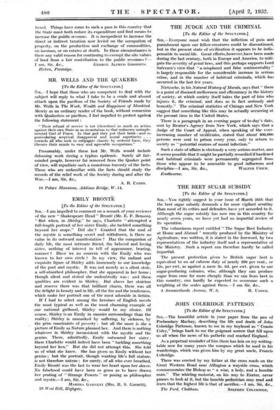EMILY BRONTE
[To the Editor of the SPECTATOR-] SIR,—I am impelled to comment on a remark of your reviewer of the new " Shakespeare Head " Bronte (Mr. E. F. Benson). " But when, in Shirley," he says, Charlotte " attempted a full-length portrait of her sister Emily, she tackled something beyond her scope." Did she ? Granted that the soul of the mystic is something secret and withdrawn, is there no value in its outward manifestation ? Has the companion of daily life, the most intimate friend, the beloved and loving sister, nothing of interest to tell of appearance, bearing, manner ? Have we no concern with the Emily who was known to her own circle ? In my view, the radiant and exquisite figure of Shirley adds immensely to our knowledge of the poet and mystic. It was not merely as a silent stoic, a self-absorbed philosopher, that she appeared in her home ; though silent and stoical she undoubtedly was; and these qualities are evident in Shirley. But above her stoicism and reserve there was that brilliant charm, there was all the delight in beauty and in life, all the fire and the tenderness, which make her portrait one of the most adorable in fiction.
If I had to select among the heroines of English novels the most typical as well as the most charming example of our national girlhood, Shirley would be my choice. Of course, Shirley is an Emily in sunnier surroundings than the reality; Shirley is unmarked by suffering, by sickness, by the grim constraints of poverty ; but all the more is she a picture of Emily as Nature planned her. And there is nothing whatever in Shirley inconsistent with the mystic and the genius. There, admittedly, Emily outsoared her sister ; there Charlotte would indeed have been "tackling something beyond her ken." But she did not attempt this. She told us of what she knew. She has given us Emily without her genius ; but the portrait, though wanting life's fell stature, is not therefore untrue ; for surely, of all who ever breathed, Emily Bronte was the last to wear her heart upon her sleeve. No falsehood could have been so gross as to have drawn her prating of * Strange Powers" or posing as philosopher and mystic.—I am, Sir, &e.,
































 Previous page
Previous page